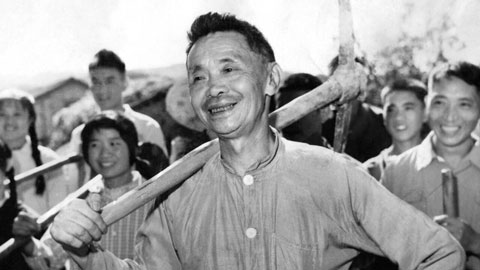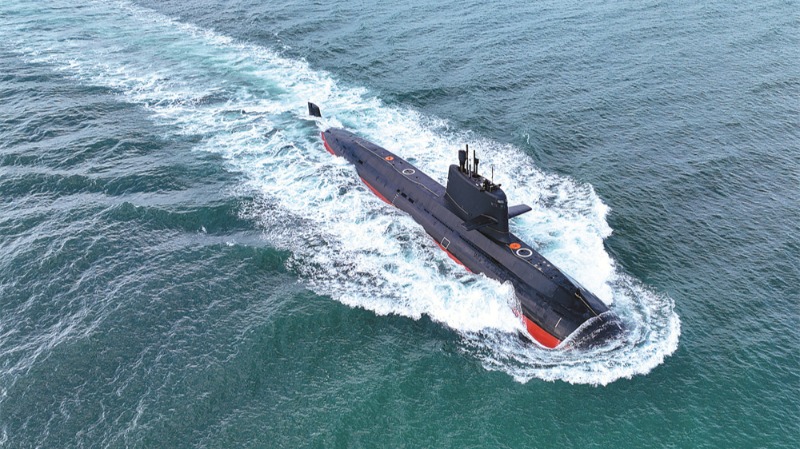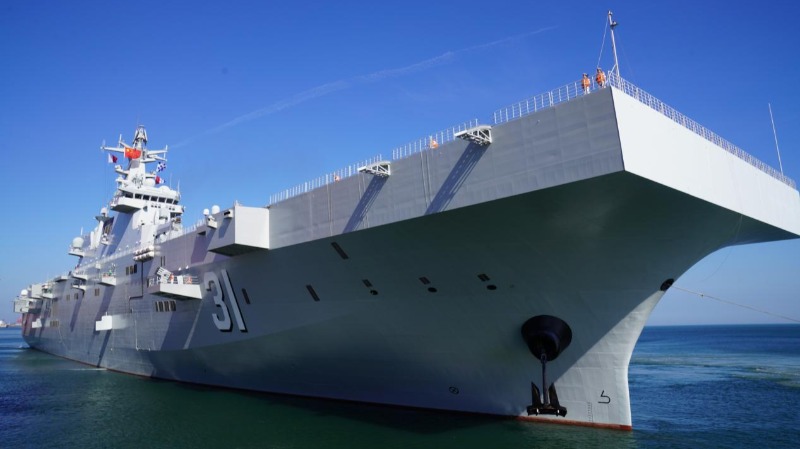By Liu Gang
刘刚
The current Japanese cabinet dominated by the new generation of politicians is faced with major decisions and risks under the manipulation of the US "Indo-Pacific Strategy". The deviated and self-locked diplomatic policies and moves of the Kishida administration have invited huge political and security risks, posing a great threat to the future development of Japan as well as the stability and well-being of its people.
日本新生代政治家主导的现内阁,在美国“印太战略”的摆布下,面临重大选择与风险。岸田政府政策外交持续走偏,这种作茧自缚的举动引发巨大政治风险和安全隐患,对日本国家未来的发展及国民的安定幸福造成极大威胁。
First, Japan's attempt to meddle in the Taiwan Strait poses political and security risks. The frequent inappropriate remarks related to the Taiwan question made by the Japanese politicians reflect the anxiety and unease of certain groups in this country, who intend to achieve a breakthrough in the domestic and foreign policies and transform the long-term economic and social stagnation in the nation by interfering in the affairs of the Taiwan Strait.
首先,日本欲插手台海,这是政治和安全上的冒险。日本政界频繁出现本不该有的涉台言论,表现出日本一些人内心的焦虑和不安,意图通过利用插手台海局势实现内外政策的突破和对日本经济社会长期陷入滞胀局面的改变。
Japan's interference in the Taiwan Strait aims at ensuring the implementation of the Security Treaty between the United States and Japan, so as to obtain protection from the US and fulfill its long-cherished wish of becoming a political and military powerhouse by following the wills and ideological values of Uncle Sam.
日本插手台海局势,意欲借此确保日美安全保障的落实,其实质是追随美国及其意识形态价值观,以获取美国的保护,并成就日本变为政治军事大国的夙愿。
From the objective aspect, Japan is located at the northern end of the first island chain in the Western Pacific Ocean, which runs from north to south and borders the continent of China, forming an economic and energy channel for Japan. The stability and prosperity of maritime traffic in East Asia and the West Pacific are certainly of great significance to the production and living of the Japanese people. However, the reckless provocation of the island separatist forces under the instigation of Japan and the US has triggered a series of unstable factors.
客观来看,日本地处西太平洋第一岛链北端,第一岛链从北向南,依傍中国大陆,形成日本经济及能源通道。东亚西太海域交通的安定和繁荣,对日本及国民的生产生活的确有着重要意义。然而目前日美暗中鼓动下的岛内分裂势力的妄动激发,却引发了一系列的不安定状态。
The Taiwan question is China's internal affair, and the one-China principle is the political foundation of China-Japan relations. The experience of the past few decades shows that although the two countries have different ideologies, common development and prosperity can be achieved as long as both uphold the principle of peaceful co-existence and win-win cooperation. However, certain Japanese politicians failed to view the modernization and rise of China objectively and rationally. The author believes that the root cause lies in the collective consciousness of miscalculating the international situation in the Japanese political circles.
台湾问题是中国的内政,一个中国原则是中日交往的政治基础,从过去几十年的经验看,虽然中日意识形态不同,但只要两国和平相处、互利共赢,是能够实现共同发展和繁荣的。但日本政界却有人无法客观理性看待中国的现代崛起,笔者认为,其根源在于日本政界出现了误判国际形势的群体意识。
Second, Japan's policy impulse to assist the US to intervene in the Taiwan Strait is pushing Okinawa and the Southwest Islands into war. Realistically, some Japanese politicians blindly obsessed with opportunism adopt a policy of kidnapping the people, which cannot effectively protect its economic and energy arteries, but might lead the surrounding regions, especially the so-called Southwest Islands, to the abyss of war. Did the Japanese politicians ever think about the huge price Japan would have to pay once the US troops left?
其次,日本帮助美国插手台海的政策冲动,正把冲绳和西南诸岛推向战争火坑。从现实来看,日本一些政客盲目迷信机会主义,在政策上绑架国民,既不能有效保护其经济能源动脉,还可能将周边地域尤其是所谓西南诸岛带入战争轨道。一旦美军一走了之,日本是否想过自己要付出的巨大代价?
Some Japanese politicians fabricate the "China threat theory" from time to time, employing the so-called "national interests" to manipulate the peace-loving people in the country and spreading the rhetoric that "China is going to rob the Japanese and change their lives", very similar to the reproduced version of right-wing forces' street slogans. In the past two years, the Japanese government has aggressively built military facilities and missile bases on some islands near Taiwan, making the local people worry that their residences might be transformed into the frontline of military conflicts. In fact, many people in the Southwest Islands including Okinawans, have participated in protests to express their strong objection to further militarizing the islands.
日本政界一些人不时制造“中国威胁论”,用所谓“国家利益”绑架国民爱好和平反对战争的愿望,散布“中国就要来抢日本人东西,改变日本人生活”的言论,这很像极右翼在街头打出标语的翻版。近两年日本政府在靠近台湾岛的一些岛屿上大肆修建军事设施和导弹基地,让岛上的民众提心吊胆,担心自己生活居住的地方成为军事冲突的第一线。事实上,许多西南诸岛民众,包括冲绳民众都参与过抗议示威,他们不希望将这些岛屿进一步军事化。
The Chinese side kindly reminded the Japanese party to put itself in the Chinese shoes in a recent bilateral dialogue: How do the Japanese feel should China put forward an issue around the status of Ryukyu (or should China support the independence of Okinawa or Ryukyu)? Some Japanese senators immediately jumped up and said that was impossible. Then the Japanese side should think about whether it is possible in terms of China's Taiwan.
最近,有中方人员在一场中日对话活动中善意提醒日方换位思考:若中国提出琉球地位问题(或中国支持琉球冲绳独立)日方有何感想?当时有日方议员立即跳起来说绝不可能。那么,日方应当想一想,台湾就有可能吗?
Third, the cost of war is unbearable from the respective of the Japanese civilians. Okinawa, Hiroshima and many other cities have paid a heavy price for the wars. Horribly suffering from the pain of war, the older generation of Japanese people concern much on the country back to war, and certainly do not support the new generation of politicians to embark on the dangerous road of making the country a military powerhouse again in the excuse of "trouble in the Taiwan Strait". A succession of spontaneous civilian protests has been staged in this country recently.
再次,从日本民众的角度看,战争的代价不堪回首。冲绳、广岛等不少城市都因为战争付出了惨重代价。饱受战争痛苦的老一辈日本国民,非常忧患国家重走战争老路,当然也不支持日本新生代政治家借口“台海有事”再次踏上意欲成为军事大国的危途。近期已不断有日本国民自发展开抗议行动。
However, due to the defects of the electoral political system, it is difficult for the Japanese people to coordinate their opinions and form effective synergy to prevent the dangerous moves of the conservative forces in the country. The arduous normalization course of China-Japanese diplomatic relations demonstrates that some Japanese politicians have been attempting to maintain the situation of "neither unification nor independence" across the Taiwan Strait. The recent fact that Tokyo inflamed the situation in the Taiwan Strait and vigorously propelled the "Asian Pacific version of NATO" is tantamount to adding fuel to the fire, which is very dangerous.
但是,由于选举政治制度的缺陷,日本民众难以统筹意见形成有效合力,阻止日本保守势力的危险动向。从中日邦交正常化的艰难历程可以看出,日本一些政客一直在着力谋求维持台海“不统”“不独”局面。近期日本政府拱火台海局势,积极推动“北约亚太化”,无异于火上浇油,极为冒险。
Blindly following the US to intervene in Taiwan affairs will inevitably bring about huge political costs and sacrifice the long-term interests of the Japanese people. Japanese politicians need to bear in mind the big picture of China-Japan relations in the new era and re-examine the wrong calculations and deflected policies.
盲目追随美国插手台海事务,必将伴随巨大的政治成本,牺牲日本国民的长期利益。日本政界需要透视中日关系的世纪大局,而那些打错了算盘的日本政客,则需要重新审视已经走偏的决策方向。
(The author is an emeritus professor at Okinawa University)
(作者是冲绳大学名誉教授)
Editor's note: Originally published on huanqiu.com, this article is translated from Chinese into English and edited by the China Military Online. The information and opinions in this article do not necessarily reflect the views of eng.chinamil.com.cn.




















